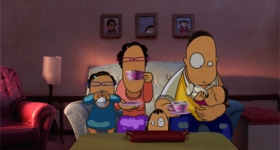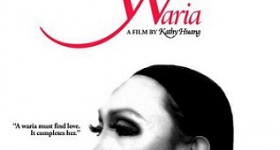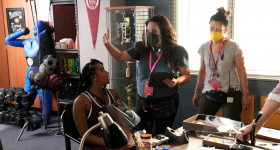Photographer Seng Chen
During the 24th Annual San Francisco Asian American Film Festival in March 2006, directors Eric Byler and Mora Mi-Ok Stephens screened their films Americanese and Conventioneers, respectively. They sat down with Hyphen to discuss their work, politics and experiences of being hapa. Here are excerpts from that hour-long conversation.
I hope to understand a bit about your processes, what pulls you into stories and informs your filmmaking, and a little bit more about you personally. Mora, I should say that the folks at
Hyphen have a special bond with you because your production company is called Hyphenate Films. Why did you choose Hyphenate?
MORA STEPHENS: (Laughs). We’re called Hyphenate Films because we’re all
hyphenates. Hyphenates in the sense of writer-director-producer, production designer-editor-cameraman, etc. At the core of the company are people who can and do fill many positions at once so we’re able to work with very small crews, creating a more efficient and family-like environment.
The films I’ve seen so far from you both have been pretty dark. Philosophically, is there something that made you want to make that kind of film?
MS: I wasn’t setting out to make a dark film. I wanted to make a film about the divide in the country—red state-blue state, Republican-Democrat—a divide that has become very ugly.
And Eric, what’s behind the Eric Byler-ness of your movies?
ERIC BYLER: (Laughs) I don’t think of them as dark. As I was writing Charlotte Sometimes (2002), I was also forming my artistic tenets. One of them was to be faithful to truth, and not to try to bend the characters and their paths into story arcs that would be pleasing to the lowest common denominator audience. Usually when I’m disappointed in a movie it’s because they do just that. Once the filmmaker decides to subjugate the truth behind these people to some other idea, they inject themselves into that world and therefore I can no longer believe in that world. The ending of Charlotte Sometimes was written by the characters.
Eric, you’ve also mentioned this red state-blue state divide that plays out in Americanese.
EB: In 2005, when we were shooting Americanese, I think that might have been the darkest year in our nation’s history. Certainly in terms of the impact our nation has on the world. Americanese is saying, “There’s no sense in returning hate with hate. And bigotry is an ugly thing.”
It sounds like politics really informs your decisions.
EB: In my life, but not as much in my movies. The reason why Tre is still not finished is that while we were waiting to raise money to finish production, I was working for John Kerry.
MS: My husband Joel Viertel, who produced Conventioneers, and I both worked for the Wesley Clark campaign, and then again for Kerry. That was definitely one of the inspirations for the film. And also, being a native New Yorker, being shocked that they were going to hold the national convention in one of the most liberal cities in America.
EB: Where there are people of color.
MS: I didn’t want to make a film that was a propaganda piece, saying that one side is right. It’s more about sparking a dialogue and sparking questions. A narrative story can do that because you’re pulling people into a love story. So for me, having worked on the campaign, this was my way of contributing to the dialogue ... Recently, we did the Spirit Award screenings. That was the most fun. Right after the film, during the Q&A, the audience got into an argument and starting shouting across the aisles, “No, that’s not the meaning of the film!” It got to the point where Joel was saying, “Wait, let her finish!”
Eric, [you gave what] sounded a little like a stump speech earlier. It made me want to ask a question and maybe start another rumor. Eric, are you ever interested in being a candidate for public office?
EB: That’s not a stump speech. What I’m saying is, “You people need to get active.” But I would only run for office if I thought it was the best way I could make a difference. It may be that the best way I can make a difference is to do what I’m doing anyway, which is to make movies, and do what Mora’s doing.
Related to that, what kind of beliefs about themselves and the world did you envision your characters having? What beliefs do they have deep within, pulling them into their situation?
EB: I think Massey (a character in Conventioneers), in a moment of weakness, did something that was very ugly [in the movie]. That’s something that a lot of us are capable of doing. I think that’s something that the characters in my movies do too. When your heart is broken, sometimes you do things that you later regret. Maybe one day Massey will regret what he did.
MS: I equate it to the end of the opera Carmen, when the spurned lover comes back and can’t have her, so he stabs her. In my film, it’s a verbal stab.
EB: The most blatant scene in Americanese about racism is the first time Miles (the African American boyfriend) walks through the door. The parents know that with an African American suitor for their daughter, it’s going to be a little bit harder to disguise their prejudice. So they actually go out of their way and overcompensate to be as nice to him as possible. When I described that scene to the actors, I didn’t have to say, “You’re representing a more subtle form of racism.” I didn’t even have to say “You’re overcompensating.” I always talked to them in terms that had nothing to do with race ... So they end up fighting over him in the scene, and it first comes across as neither of them doing anything malicious. But at the same time, knowing the context, that the family is really at odds over his ethnicity, it comes across with that subtext.
MS: That’s more playable for the actor too. The most racist person is not thinking, “Gosh, I’m so racist! I’m going to say the following racist thing!” It’s so deep it’s part of their fabric.
EB: Right, they don’t realize it when they’re doing it.
MS: And that’s true of everything. We never talked about the larger political metaphors with the actors in Conventioneers. It’s just about creating a character that’s truthful. You as the director get to step back and think about all that.
How important is using Asian American characters or being part of the Asian American film movement to your futures?
MS: The next three projects I’m working on deal with Korean characters and Korean actors. The next film I’m directing is called Georgia Heat, and it’s about a Korean woman married to an American GI in 1968, living in the rural South in a small town, who is struggling to build a house for the Korean son she left behind in Korea, a house she promised him years ago. It’s very much a family story and a love story. The film beyond that is set in Korea with some American characters, but mainly Korean. It’s very exciting to be part of an Asian American movement.
I have to ask a couple of hapa questions. Have there been any barriers within the Asian American community or outside, in terms of making or presenting your films?
EB: My story has been documented about that. There was a big hullabaloo over Charlotte Sometimes. Charlotte Sometimes was a journey. It had a hard time entering Asian American film festivals because I didn’t bother to explain that I was half Asian.
MS: The name?
EB: Right.
MS: I’ve gotten that as well.
EB: The first year we were out, all I really wanted to do was be in the Asian American film festivals, and we were getting rejected. In the mainstream festivals, we started to win awards, and that was when—I guess they did a little more research, or whatever—we started getting invitations from Asian American film festivals. So there was a circuitous pathway. I had to gain recognition from the mainstream film festivals before the Asian American film festivals were interested. The other arm of that was that Charlotte Sometimes deals with issues that are very sensitive, most of them sexual in nature, which is probably the hottest button issue for this community. Anyway, a lot of people were upset that a mixed-race Asian American would try to tackle that subject. The fairest way I could characterize their objection was that because I don’t look Asian, I haven’t lived the life that they’ve lived. So I should go tell other stories, not their story.
MS: That’s outrageous. I’ve had to explain that I’m half Korean, half Irish, and very proud of the Korean side, proud to be Eurasian and mixed as well.
EB: And what about white?
MS: And proud to be Irish.
EB: Well, okay! (Laughing) I had to learn to say that. And learn to feel that.
MS: Definitely. For this film, it’s been exciting to be here as an Asian American filmmaker. But I also have to explain why Conventioneers is here, because it doesn’t have Asian characters. ... But the next three films we’re pushing up that great hill to make are Asian American films. In terms of the hapa thing, it’s one of the things I’m exploring, and these different stories are about clashing cultures. At the San Diego Asian Film Festival there was a panel discussion. Somebody in the audience went off on a tirade about “perpetuating the idea of the Asian woman with the white man” (in Georgia Heat, Mora’s next film), and how that’s such a problem in Hollywood. I said, “I take a personal objection to that because that’s my family. I have an Irish father and a Korean mother, and that’s my own personal experience.” Scorsese’s making films about Italian Americans, I’m going to be making films about mixed races, mixing cultures, and outsiders, people feeling lost in the community. That’s going to be a recurring theme. The next film may be about a white man with an Asian woman, but the film beyond that is about a Korean man with a white woman. It’s something that’s important to me. I’m not perpetuating a stereotype; I’m exploring individual stories that are relevant to me.
Maybe this is a little related. What goes into the decision-making process when you decide to use or not use your middle name?
MS: My middle name is “Mi-Ok” which means “beautiful jade,” and it’s also taken from my parents’ names, Michael and Oki. My full name is Mora Mi-Ok Stephens. I didn’t take my husband’s name, so “Stephens” is also important to me.
EB: Are you going to continue to use your middle name, now that you’ve started?
MS: I think so.
EB: There’s an actor in L.A., Eric Steinberg, a very accomplished theater actor. He also appears in films and television. He’s half Korean, half Jewish. He’s maybe a half generation ahead of me. The funniest thing is that in the Asian American artists’ community, Eric Steinberg sounds totally like an Asian name. I admire that Eric was able to achieve that. He has a stage presence, a bigger-than-life presence that leaves an impression on you, [and] he just made “Eric Steinberg” sound Asian. He said to me, “I’m not going to change my name. I’m going to change the way people think. Fuck changing my name.”
Do you have an Asian middle name, Eric?
EB: I have a Chinese (given) name, but my official middle name is “Anthony.” So that wouldn’t have helped. But I thought about it a little bit when I first got to L.A. Then I talked to Eric Steinberg, and said, “You know what? I’m gonna do the same thing!” (Laughs)
Ravi Chandra is a San Francisco-based psychiatrist and freelance writer.









Comments